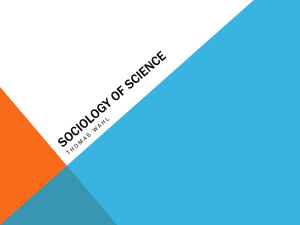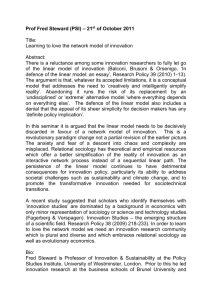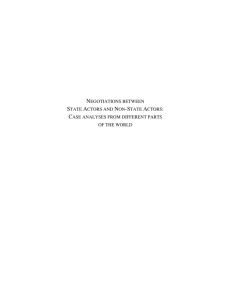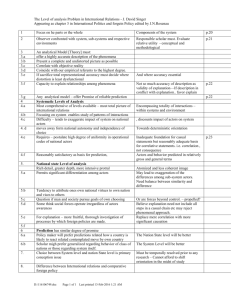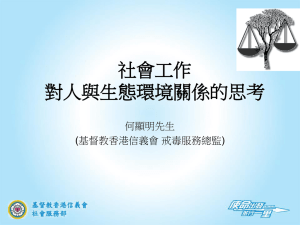Sociological perspective - LaGSus.de
advertisement
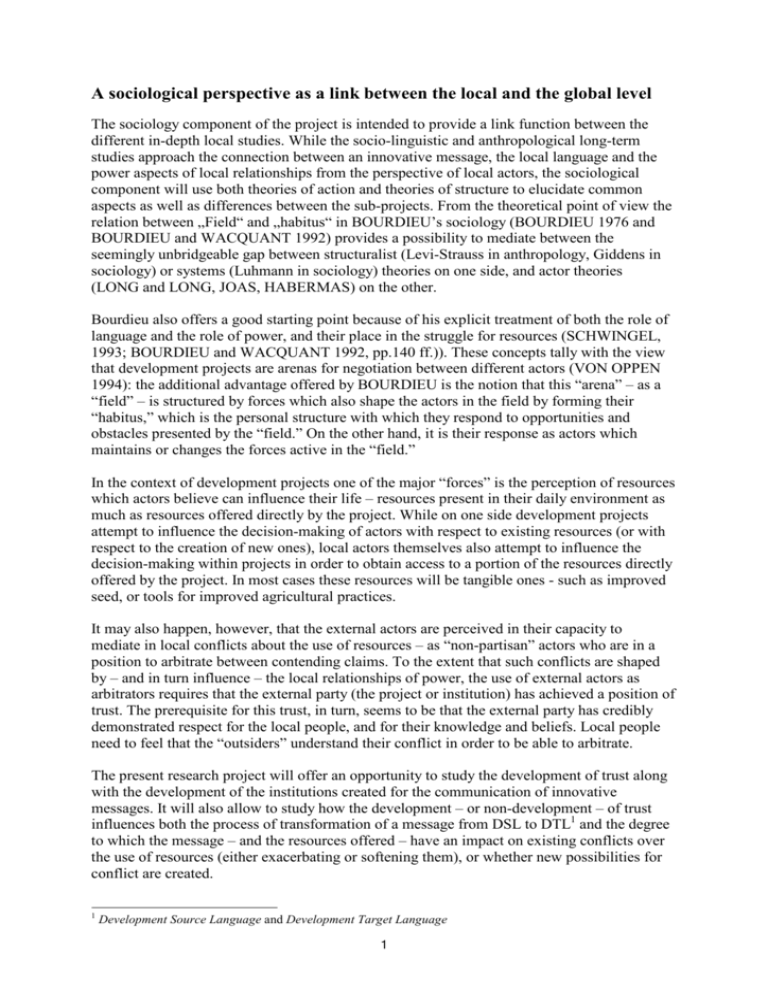
A sociological perspective as a link between the local and the global level The sociology component of the project is intended to provide a link function between the different in-depth local studies. While the socio-linguistic and anthropological long-term studies approach the connection between an innovative message, the local language and the power aspects of local relationships from the perspective of local actors, the sociological component will use both theories of action and theories of structure to elucidate common aspects as well as differences between the sub-projects. From the theoretical point of view the relation between „Field“ and „habitus“ in BOURDIEU’s sociology (BOURDIEU 1976 and BOURDIEU and WACQUANT 1992) provides a possibility to mediate between the seemingly unbridgeable gap between structuralist (Levi-Strauss in anthropology, Giddens in sociology) or systems (Luhmann in sociology) theories on one side, and actor theories (LONG and LONG, JOAS, HABERMAS) on the other. Bourdieu also offers a good starting point because of his explicit treatment of both the role of language and the role of power, and their place in the struggle for resources (SCHWINGEL, 1993; BOURDIEU and WACQUANT 1992, pp.140 ff.)). These concepts tally with the view that development projects are arenas for negotiation between different actors (VON OPPEN 1994): the additional advantage offered by BOURDIEU is the notion that this “arena” – as a “field” – is structured by forces which also shape the actors in the field by forming their “habitus,” which is the personal structure with which they respond to opportunities and obstacles presented by the “field.” On the other hand, it is their response as actors which maintains or changes the forces active in the “field.” In the context of development projects one of the major “forces” is the perception of resources which actors believe can influence their life – resources present in their daily environment as much as resources offered directly by the project. While on one side development projects attempt to influence the decision-making of actors with respect to existing resources (or with respect to the creation of new ones), local actors themselves also attempt to influence the decision-making within projects in order to obtain access to a portion of the resources directly offered by the project. In most cases these resources will be tangible ones - such as improved seed, or tools for improved agricultural practices. It may also happen, however, that the external actors are perceived in their capacity to mediate in local conflicts about the use of resources – as “non-partisan” actors who are in a position to arbitrate between contending claims. To the extent that such conflicts are shaped by – and in turn influence – the local relationships of power, the use of external actors as arbitrators requires that the external party (the project or institution) has achieved a position of trust. The prerequisite for this trust, in turn, seems to be that the external party has credibly demonstrated respect for the local people, and for their knowledge and beliefs. Local people need to feel that the “outsiders” understand their conflict in order to be able to arbitrate. The present research project will offer an opportunity to study the development of trust along with the development of the institutions created for the communication of innovative messages. It will also allow to study how the development – or non-development – of trust influences both the process of transformation of a message from DSL to DTL1 and the degree to which the message – and the resources offered – have an impact on existing conflicts over the use of resources (either exacerbating or softening them), or whether new possibilities for conflict are created. 1 Development Source Language and Development Target Language 1 It is important to note that we do not hypothesise a priori that there must be conflicts. Rather, the hypothesis is that projects always involve the introduction of resources into the local networks and that the use of these conflicts can be dealt with either through conflicts or through collaboration. The working hypothesis then becomes that the higher the use of local languages, the more likely the development of relationships of trust rather than of conflict. A secondary hypothesis is that this role of mediation in local arrangements (which can be but need not necessarily be disputes) about the use of resources can be played more successfully if the staff of projects or institutions is aware of their influence on local distributionary games. It can be expected that by focussing on such questions the research project itself will have an impact on these processes of negotiation and arbitration – and that therefore the researchers themselves may be accorded such mediating roles in the communicative processes to be studies. To the extent that even the study of such details of communicative processes and relationships requires a degree of trust which invests the bearers of this trust with the qualities required to play mediating roles, it seems unavoidable that the researchers will be drawn to some extent into the communicative processes studies. The best that can be done, therefore, is to accept this involvement – if it comes about as hypothesised here – with as much impartiality and equanimity as possible. The requirement of scientific objectivity will in this context become a resource in itself and turn into objectivity – or rather: impartiality – concerning diverging (or conflicting) local interests about the use of resources. The reflection of the – social and linguistic - conditions under which researchers are asked to play such mediating roles will in itself become one of the sources of information for the project. In German development sociology there are indications (as shown by contributions to a meeting of the Sektion Entwicklungssoziologie of the Deutsche Gesellschaft für Soziologie (DGS) in June 2000 in Berlin) to see „power“ in terms of „control over resources.“ This view fits into the common understanding of sustainable development, as first published in the report “Our Common Future”: "Sustainable development is development that meets the needs of the present without compromising the ability of future generations to meet their own needs. It contains within it two key concepts: • the concept of "needs", in particular the essential needs of the world's poor, to which overriding priority should be given; and • the idea of limitations imposed by the state of technology and social organization on the environment's ability to meet present and future needs. Thus the goals of economic and social development must be defined in terms of sustainability in all countries -- developed or developing, market-oriented or centrally planned. Interpretations will vary, but must share certain general features and must flow from a consensus on the basic concept of sustainable development and on a broad strategic framework for achieving it. Development involves a progressive transformation of economy and society. A development path that is sustainable in a physical sense could theoretically be pursued even in a rigid social and political setting. But physical sustainability cannot be 2 secured unless development policies pay attention to such considerations as changes in access to resources and in the distribution of costs and benefits. Even the narrow notion of physical sustainability implies a concern for social equity between generations, a concern that must logically be extended to equity within each generation." The importance of the term sustainable development has been demonstrated by two major global conferences in Rio de Janeiro and Johannesburg and has triggered a considerable literature on the topic (see, for example REDCLIFT 1987, REID 1995), while the contribution of sociology to has until recently been much less clear (BRAND et al). This project aims at increasing our knowledge of how the interplay between relationships of power (both at the local level – particularly between men and women – and between the local level and the region, the state, and ultimately the global level) and the ability to negotiate actions in either the local or another shared language influences the use of resources. The innovative aspect of the present project is to see the local language as one of the resources which allow for a better management of aspects of sustainability even with respect to natural resources. This fits with Bourdieu’s concept of considering language and social relationship explicitly as “resources” (which he terms “social capital,” “symbolic capital” and “cultural capital” respectively). With respect to the present project, the increasing acknowledgement of the perspective of sustainable livelihoods as developed by CHAMBERS (quoted in REDCLIFT 1987, p.36) seems important and provides a unifying concept: in all project areas the local people will have views on the sustainability of their livelihoods, including differences within the community. At the same time all projects involved have a view of the sustainability of both the natural resources and the way of life of the community in their respective areas. The question of “control over resources” is thus immediately relevant both to local actors and to the propagators of innovative messages aimed at improving the livelihoods of local people (as “development” is commonly understood). Adding onto existing conceptions of sustainability as a use of natural resources in such a way as to “meet present needs without compromising the ability of future generations to meet their needs” this project explicitly takes into account non-physical needs (for communication, for making sense, for justice) of present as well as future generations. The research questions seek to elucidate to what extent local populations consider such questions of long-term sustainability of the use of natural resources (which play an explicit role both in the Kaili and in the Herero area, but are also implicit in the attempt to introduce improved varieties of cassava in the Tura area) – with a particular emphasis on seeking to clarify the role of concepts embedded in the local languages to consider such questions. After the initial exploratory field visits it has become clear that there is a greater need to consider the role of institutions at the local level which provide some form of a formal “stage” for the discussion and adaption of exogenous messages (the aspect of the transformation of a DSL concept into a DTL2 concept). The working hypothesis is that such an institution gives a legitimate place for processes of negotiation about new concepts. The sociological component will stimulate the discussion between the project components about the role which local power relationships play in such institutions: • 2 Who has access to these institutions? Development Source Language and Development Target Language 3 • • • • Who has the right to publicly speak? Which topics can be spoken about? What controls the “voiceability” of topics? What are the consequences for actual resource use? The contribution of the sociology component will be in particular to remind the other researchers of the importance of the last question: in this manner we will gain a more realistic understanding about the relationship between the “reality” of local actors (including the exogenous actors who promote innovative messages) and how they represent this reality in the discourses to be studied explicitly. The comparative perspective will focus on how certain topics are systematically excluded from public discourse because they might jeopardise local power relationships and hence strategic interests concerning the control of resources. The new area opened up empirically will be to explore how the struggle over the control of resources is conducted both through explicit verbal strategies (using local languages and their store of metaphors and their associated styles of expression as a resource) and through strategies of exclusion from public discourse. Based on the explicit interest expressed by virtually all institutions in project areas, the question of the institutionalisation of the discourse on innovative/innovating messages and their relation to resource use and sustainability will be discussed explicitly with project staff. While the anthropological / socio-linguistic researchers will focus on how notions of “development”, “sustainability”, “social relationships” (particularly gender relationships and power relationships) are constructed at the local level, the sociology component will focus on investigating how the same notions are constructed by project staff. The innovative aspect of the research project will be the attempt to discuss these different ways of “constructing reality” (BERGER and LUCKMANN, 1969) with the actors themselves: to study how the mutual making aware of different ways of construction by the “other” group will affect the communication process and the sustainability of the results. This is particularly important because it is highly likely that local populations will – in all areas – see the projects themselves as (non-sustainable) resources for their own livelihood strategies. In this respect the project aims at expanding the common understanding of “local knowledge” and its interaction with “global knowledge.” It is commonly understood that local knowledge offers ways of acting which allow the (more or less “sustainable”) use of natural resources for personal well-being. This view has been documented consistently in the Indigenous Knowledge and Development Monitor. Sociology has added the perspective that development projects are an “arena” in which the struggle for resources is carried out. This project attempts to study how “dealing with the project” is increasingly becoming part of “local knowledge” – as a way to increase the resources available for the local population. This topic also refers to the second major contribution the sociology component hopes to make to the project: to link the local discussions to the global discussions about sustainable development and related questions such as the relationship between local knowledge and global (and particularly scientific) knowledge. Not only has this become a major focus of more recent anthropological (WARREN et al1995) and agricultural research (DE BOEF et al 1993, Indigenous Knowledge and Development Monitor, now Indigenous Knowledge Worldwide). This addition to previous themes is deemed necessary not only because it is congruent with the perspective of “sustainable livelihoods” which require certain action strategies (for which reason Bourdieu’s theory of praxis becomes important), but also because 4 the importance of indigenous knowledge is given some prominence in the major document of the Rio Summit on Sustainable Development, the Agenda 21 (Chapter 36): Indigenous Peoples support the development of a "New Partnership" between Indigenous Peoples and Western Peoples based on mutual and equal respect. Moreover, a new ethic as proposed by the International Treaty whereby Western institutions must develop new policies which pronounces "listening and learning" from Indigenous Peoples. This point is also emphasized in the report Our Common Future. Support for more public forums, dialogues and conferences between Indigenous Peoples and other stakeholders would be a significant step in generating an understanding and awareness regarding Indigenous knowledge, values and culture related to living sustainably with the Earth. In addition, these values and insights should be incorporated into national strategies, and into resource management plans and policies. This seems particularly relevant because experience has shown in many areas that local natural resources not only provide the basis of livelihood strategies for local people, but are also regarded as valuable resources for extractive use by outside groups. Our approach thus aims at providing a link between global negotiation positions such as those expressed by the Scientific Advisory Council to the German Government for the Johannesburg Summit on Sustainable Development (which does not even mention “livelihood strategies” – whether sustainble or not) and the increasing consideration given to the sustainability of local (i.e. “indigenous”) livelihood strategies, acknowledging also their environmental value (see POFFENBERGER 1990). In this respect the project intends to heed the call for “educating the public through interdisciplinarity”, which has been advanced at the University Presidents’ Workshop on “Learning and Sustainability” (MACLEOD et al, March 1995). It also bears in mind the role of science as envisaged in the influential “Agenda 21” (Chapter 35): One of the roles of the sciences should be to provide information to better enable the formulation and selection of environment and development policies in the decision-making process. In order to fulfil this requirement, it will be essential to enhance scientific understanding, improve long-term scientific assessments, strengthen scientific capacities in all countries and ensure that the sciences are responsive to emerging needs. It will be considered the particular role of the sociological component of the research project to initiate local discussions on possibilities to measure the sustainability of environmental resources and of strategies of their use, based on models provided by the project on Measuring Sustainability by theIISD (International Institute for Sustainable Development), in particular on attempts to make sustainability measurable at the village level (see AJIM, undated). It is to be expected that this attempt would be linked to developing institutions for development communication and substantially contribute to demonstrating the value of local languages as a resource. This part of the research will need close interdisciplinary collaboration between the sociology component and the local researchers in the preparatory as well as in the implementation phase. The theoretical contribution of the sociology component The sociological theoretical model aimed at by this project - as a heuristic device to make diverse intercultural and environmental communications and situations comparable and based on the empirical findings of the “10 heuristic questions” - conceives of a distinction between “resources” and “actors.” Actors vie for resources (collaboratively or competitively) and in 5 their ways of acting are influenced by their “habitus” as a result of (ongoing) socialisation). The interesting opportunity offered by the project is to study how two clearly distinct groups of actors and groups of resources interact: • • Local actors perceive local resources (and appropriate ways of dealing with them), but also “external” actors and resources (and appropriate – and more or less tentative – ways of dealing with them. External actors also perceive both external resources (and appropriate ways of using them) and local actors and resources and (and appropriate but also necessarily tentative was of dealing with them). The interdisciplinary and innovative approach of the present research project aims at making some of the commonly only tacit perceptions of the “other” group explicit. It also aims at elucidating the strategies used by members of one group to influence the use of resources of the other group. The most interesting aspect will be to study the role which misunderstandings based not only on language but also on the cultural “habitus” of different actors play in the conception (or misconception) of communication and action strategies of different actors – and their effect on the actual use of resources. In this respect the research project is likely to be one of the first empirical “tests” of Bourdieu’s theory of praxis in an international situation. It will also provide an opportunity to compare the heuristic value of this approach with that of Habermas’ theory of communicative action, which has been used as an explanatory model for participatory approaches in agricultural research (DRINKWATER 1994). This view also takes into account the results about the importance of local relationships of power for the success or failure even of explicitly participatory approaches to development (MOSSE 1995). References Berger, Peter and Luckmann, Thomas (1969): Die gesellschaftliche Konstruktion der Wirklichkeit – Eine Theorie der Wissenssoziologie; Frankfurt / Main (S. Fischer) Bourdieu, Pierre (1976): Entwurf einer Theorie der Praxis; Frankfurt am Main (Suhrkamp) Bourdieu, Pierre; and Loic J.D. Wacquant (1992): An Invitation to Reflexive Sociology; Cambridge (Polity Press) Brand, Karl-Werner (ed. 1997): Nachhaltige Entwicklung – Eine Herausforderung an die Soziologie; Opladen (Leske und Budrich) De Boeuf, Walter; Kojo Amanor and Kate Wellard, with Anthony Bebbington (1993): Cultivating Knowledge – Genetic diversity, farmer experimentation and crop research; London (Intermediate Technology Publications) Drinkwater, Michael (1994): Knowledge, consciousness and prejudice: adaptive agricultural research in Zambia; in: Scoones, Ian and John Thompson (1994): Beyond Farmer First – Rural People’s knowledge, agricultural research and extension practice; London (Intermediate Technology Publications), pp.32-40 Habermas, Jürgen (1984): Vorstudien und Ergänzungen zur Theorie des kommunikativen Handelns, Frankfurt am Main (Suhrkamp) Long, Norman and Ann Long (eds. 1992): Battlefields of Knowledge – The interlocking of theory and practice in social research and development; London (Routledge) MacLeod, Jack and Carla Doucet (ed, March 1995). University Presidents’ Workshop — Learning and Sustainability. Ottawa, Canada: National Round Table on the Environment and the Economy (NRTEE) Mosse, David (1995): Local institutions and power: the history and practice of community management of tank irrigation systems in South India; in: Nelson, Nici and Susan Wright 6 (1995): Power and Participatory Development – Theory and Practice; London Intermediate Technology Publications), pp.144-156 Nadal, Ajim (undated): Community level sustainability assessment – Dasudi, India; http://www.iisd.org/measure/scipol/docs.htm Poffenberger, Mark (ed. 1990): Keepers of the Forest – Land Management Alternatives in Southeast Asia, West Hartford (Kumarian Press) Redclift, Michael (1987): Sustainable Development – Exploring the Contradictions; London (Routledge) Reid, David (1995): Sustainable development – an introductory guide; London (Earthscan) Schwingel, Markus (1993): Analytik der Kämpfe – Macht und Herrschaft in der Soziologie Bourdieus; Hamburg (Argument-Verlag) von Oppen, Achim and Kate Crehan (1994): "Understandings of 'development': an arena of struggle. The making of a development project in North-Western Province." In: Kate Crehan und Achim von Oppen (Hg.), Planners and History. Negotiating Development in Rural Zambia. Lusaka: Multimedia Publications, S. 257-304. Warren, Michael D.; L. Jan Slikkerveer and David Brokensha (1995): The Cultural Dimension of Development – Indigenous Knowledge Systems. London (Intermediate Technology Publications) WBGU(Wissenschaftlicher Beirat der Bundesregierung für Globale Umweltveränderungen) Politikpapier 1 (2001): Die Chance von Johannesburg: Eckpunkte einer Verhandlungsstrategie; Berlin Additional web-resources: Agenda 21: http://www.doc.mmu.ac.uk/aric/eae/Sustainability/Older/Agenda21.html Sustainable Development on Campus Resource Links: http://iisd1.iisd.ca/educate/reslist.htm UN Indicators for Sustainable Development: http://www.un.org/esa/sustdev/indisd/english/english.htm 7
